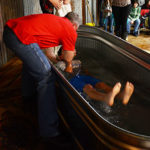DURHAM, N.C. (ABP) — Evangelical churches do a better job than mainline churches in keeping their young people in the faith, probably because they invest more money in youth ministry, says a Duke University professor who studies characteristics of American congregations.
Mark Chaves, a professor of sociology, religion and divinity and director of the National Congregations Study, said in a blog July 8 that research from the ongoing national survey effort to gather information about the basic characteristics of America's congregations confirms that religious groups prioritize youth ministry differently.
|
Mark Chaves
|
Among churches that have 50 or more teenagers, Chaves said white evangelical congregations are substantially more likely than mainline Protestant churches to employ a full-time youth minister.
Fifty-nine percent of evangelical churches with 50-99 teens have a full-time youth minister, compared to only one third of mainline churches with that many youth. In churches with more than 100 youth, the gap increases to 87 percent for evangelicals to 55 percent of mainline churches.
Chaves said mainline and evangelical Protestants do not differ much on overall programming for youth. Both are equally likely to have youth groups, teen choirs, youth speaking at a worship service or to have sent teenagers to a church camp.
But those ministries "are inexpensive compared to hiring a full-time youth minister, and having a full-time youth minister surely enhances the quantity and quality of a church’s teen programming."
Chaves said that both evangelical and mainline Protestants lose many young people to "the ranks of the religiously unaffiliated," but evangelical churches lose fewer than liberal churches lose. He speculated that one reason might be that mainline churches put less value on keeping their teenagers in the flock.
"It is difficult to know for sure, but evangelicals' deeper concern to reproduce the faith in their children probably leads to hiring more full-time youth ministers, which probably leads to keeping more youth in the church," he wrote. "Evangelical churches invest more than mainline churches in youth ministries, and it is difficult to avoid the conclusion that this investment difference reflects a difference in the priority placed on keeping young people in the church."
Sign up for our weekly edition and get all our headlines in your inbox on Thursdays
Chaves cited a book by University of Washington professor James Wellman, Evangelical vs. Liberal, that observes how different church cultures view youth ministry in different ways.
"For evangelicals, if children and youth are not enjoying church, it is the church's fault and evangelical parents either find a new church or try to improve their youth ministry," Wellman said. "For liberals, the tendency is the reverse; if youth do not find church interesting it is their problem. Evangelicals are simply more interested and invested in reproducing the faith in their children and youth and their churches reflect this priority."
"Evangelical families emphasize religion more than mainline families do, and evangelical churches involve young people in a denser social web of youth groups, church camps, and church-based socializing, all of which increase the chances that a young person will remain in the fold as an adult," Chaves concurred. "This is one reason that evangelical denominations have not suffered the same membership declines in recent decades that more liberal, mainline denominations have suffered."
–Bob Allen is senior writer for Associated Baptist Press.














We seek to connect God’s story and God’s people around the world. To learn more about God’s story, click here.
Send comments and feedback to Eric Black, our editor. For comments to be published, please specify “letter to the editor.” Maximum length for publication is 300 words.